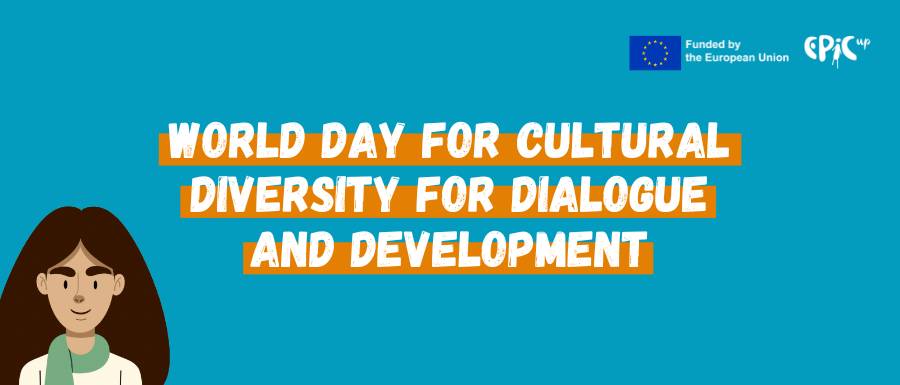On 21 May 2025, the EPIC-UP project joins people around the globe in recognising the World Day for Cultural Diversity for Dialogue and Development. First proclaimed by the United Nations General Assembly in 2002, this day highlights the richness of the world’s cultures and the essential role of intercultural dialogue in fostering peace, inclusion, and sustainable development.
At a time when global challenges test the social fabric of communities, this year’s observance is more relevant than ever. As societies grow more diverse, recognising and embracing cultural pluralism is not only a matter of human rights, but also of social resilience and innovation. In 2025, we are reminded that bridging cultural differences is not a utopian idea, but a tangible necessity for democratic, cohesive societies.
Recognising cultural diversity
Cultural diversity is central to who we are as individuals and communities. It shapes our identities, values, and ways of living. But its true power lies in its potential to bring people together, foster understanding, and drive social progress. Yet today, this potential is far from fully realised. Across Europe and beyond, polarisation, cultural misunderstandings, and exclusion continue to marginalise communities and hinder progress towards equality.
UNESCO calls for more concrete action in recognising cultural diversity as a global public good, embedding diversity and dialogue into education, urban planning, media representation, and digital spaces. The goal is to move from symbolic celebration to structural transformation.
Initiatives at EU level
Cultural diversity is a fundamental value of the European Union, embedded in Article 167 of the Treaty on the Functioning of the EU: ‘The Union shall contribute to the flowering of the cultures of the Member States, while respecting their national and regional diversity and at the same time bringing the common cultural heritage to the fore’. In practice, several EU initiatives actively support the promotion of cultural expression, inclusion, and collaboration across communities.
One of the most prominent is the Creative Europe programme. With a budget of €2.44 billion for 2021–2027, Creative Europe funds thousands of projects in the cultural and audiovisual sectors. Since 2014 the programme has been supporting projects that range from transnational theatre productions to community storytelling in migrant neighbourhoods.
To increase the visibility of Europe’s culture, the EU supports a variety of actions, initiatives, and prizes, such as the European Capitals of Culture, and initiative designed to:
- Highlight the richness and diversity of cultures in Europe
- Celebrate the cultural features Europeans share
- Increase European citizens’ sense of belonging to a common cultural area
- Foster the contribution of culture to the development of cities
The European Capitals of Culture 2025 –Chemnitz (Germany) and Nova Gorica/Gorizia (shared by Slovenia and Italy)- are hosting special programmes that highlight the power of cross-border arts, cultural participation, and civic engagement in strengthening social cohesion.
Another key instrument is the EU Anti-Racism Action Plan (2020–2025), which includes measures to improve cultural representation and diversity in media, education, and public institutions. It promotes structural change by supporting cultural projects that challenge racism and stereotypes, particularly through civic engagement and capacity-building.
The Citizens, Equality, Rights and Values (CERV) programme also plays a role in promoting dialogue and inclusion. In 2025, CERV continues to fund grassroots organisations working on migrant inclusion, intercultural understanding, and democratic participation.
Together, these programmes reflect the EU’s recognition that cultural diversity is not a passive heritage, but an active force for building democratic and cohesive societies.
The role of EPIC-UP
In this landscape, the EPIC-UP project wants to play a role. By establishing Communities of Practice (CoPs) in six countries (Bulgaria, Germany, Greece, Italy, Poland, and Spain) EPIC-UP supports local ecosystems of inclusion. These CoPs bring together local authorities, migrants’ associations, civil society, researchers, and businesses to co-design policies and services that reflect real, lived diversity.
Through social innovation and experimentation, EPIC-UP empowers local stakeholders to test and refine new approaches to migrant integration and intercultural dialogue. From inclusive forums in Brescia to refugees’ kitchen in Oberhausen, these initiatives respond to specific local needs while feeding into broader European strategies.
On 21 May 2025, EPIC-UP highlights stories from its CoPs that show how cultural diversity is being translated into practice -how a shared meal, a collaborative theatre workshop, or a co-designed community service can become a building block for solidarity, civic engagement and stronger communities.
